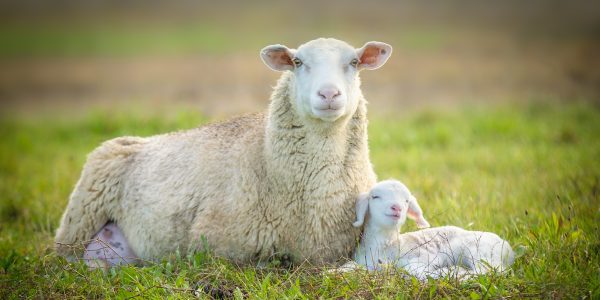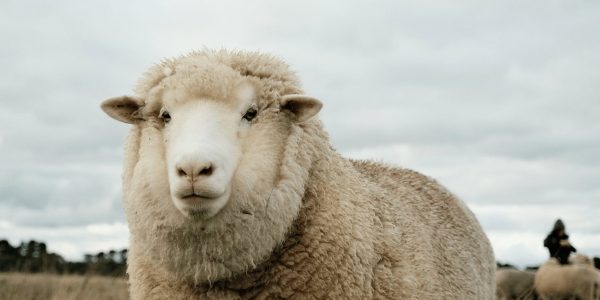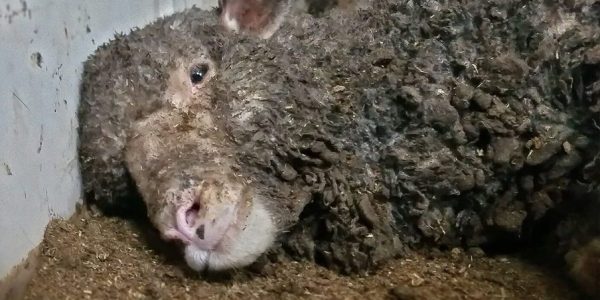The below dot points are provided as guidance, but please remember to write your responses in your own words (answers that are ‘copied and pasted’ may result in them being lumped together. Your own words will be the most impactful for sheep.
The government survey can be found here.
Q1 – Q5:
- Questions 1 through 5 request your personal details.
Q6: Do you support or oppose the phase-out of live sheep exports by sea?
Q7. If you support the phase-out of live sheep exports, please identify why you support the phase out, including any social or economic benefits of a phase out.
Please remember to use the dot points as guidance only and to write your responses in your own words.
- Live sheep export is cruel and unnecessary.
- Transport is inherently stressful for animals. To keep stress to a minimum, all transport distances should be as short as possible, and this reality has always meant the live export trade cannot meet basic animal welfare standards.
- Sheep exported from Australia endure un-stunned slaughter overseas. Un-stunned slaughter is cruel and painful, and it is illegal in Australia (with a small number of exemptions for Kosher and Halal slaughter).
- Polling consistently shows the majority of Australians support the phase out of live sheep export.
- Multiple economic reports have concluded that live sheep export is not in Australia’s long-term economic interests. And, that ending the trade would create jobs in Australia.
- Most Australian sheep farmers don’t live export and still run profitable businesses.
Q8. If you oppose the phase-out live sheep exports, please identify the key social and economic impacts of the phase-out on regional communities in New South Wales.
- N/A (if you support the phase-out, you do not need to answer this question)
Q9. Do you believe that there are sufficient support mechanisms for affected communities to transition to the phase-out of live sheep exports by sea?
Q10. Please provide any detail on why there are or are not sufficient support mechanisms for affected communities in the transition to the phase-out of live sheep exports by sea (max 200 words).
- NSW farmers don’t export live sheep by sea, therefore this transition to the phase-out of live sheep exports by sea should not impact them.
Q11. Do you have any animal welfare concerns with live sheep exports?
Q12. If you answered yes to Question 11, please explain your concerns (max 200 words).
- Long-distance transport, especially by sea, is inherently stressful and risky for sheep.
- Sheep routinely suffer from heat stress, illness, starvation from failing to eat the unfamiliar food on board, injury and even sea sickness.
- Sheep suffer and die on every live export shipment that leaves Australia.
- Importing countries practice un-stunned slaughter, subjecting sheep to painful and terrifying deaths.
- Since regulations that require animals to be kept within approved supply chains were introduced, there has been evidence of sheep being sold for private slaughter every year. Evidence has revealed sheep being shoved into car boots, left tied up in scorching heat, dragged and handled in cruel and rough ways, and killed in the street or backyards by untrained and ill-equipped slaughtermen.
- Despite some export companies having multiple regulatory breaches against them, none have had their licence suspended.
- It is clear that profits will always trump animal welfare in the live sheep trade.
Q13. Do you believe that the Australian Government should provide compensation to NSW sheep producers due to the phase-out of live sheep exports by sea?
- No; there is no need for compensation because NSW sheep producers do not export their sheep by sea.
Q14. Please outline possible alternative markets and opportunities for NSW sheep producers after the phase-out of live sheep exports by sea (max 200 words).
- Alternative markets and opportunities are not necessary for NSW sheep producers after the phase-out because NSW doesn’t export live sheep by sea. NSW sheep producers already access the boxed meat export trade which is experiencing record growth due to rising demand for Australian lamb and mutton, including from the Middle East.
- The Terms of Reference of this Inquiry query whether the phase-out in WA could result in either scarcity or over-abundance of WA sheep in NSW. There is no evidence to support this concern. In fact, the latest economic analysis concludes the phase-out of live sheep export from WA will have little to no impact on sheep producers in NSW, including no discernible impact on NSW sheep prices.
Q15. Do you have any other comments on the impact of the phase-out of live sheep exports by sea on NSW? (max 200 words)
- As above, as NSW doesn’t export live sheep by sea, there will be little to no impact of the phase-out of live sheep exports by sea on NSW.
Ready? Head to the government survey now.










